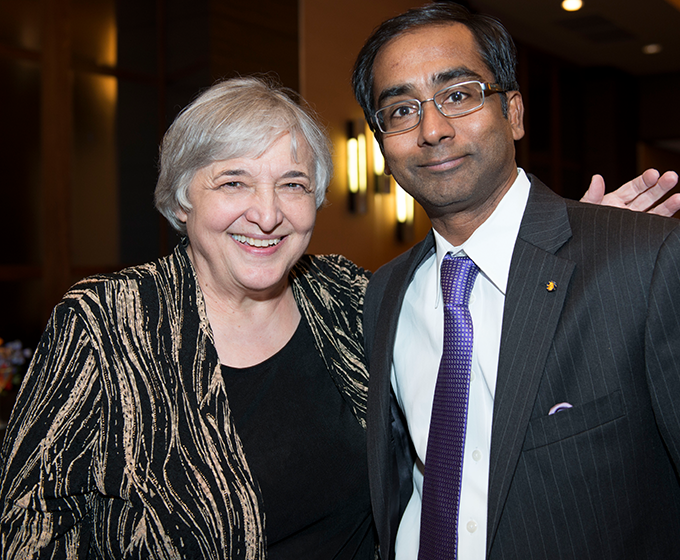Dec. 5, 2019 — Rena Bizios, Lutcher Brown Chair and professor of biomedical engineering at UTSA, has been elected a fellow of the National Academy of Inventors.
The honor recognizes Bizios for demonstrating a prolific spirit of innovation in creating or facilitating outstanding inventions that have made a tangible impact on quality of life, economic development and the welfare of society.
“Dr. Bizios exemplifies research excellence and scholarly output. Her induction brings great acclaim to the university and demonstrates the institution’s commitment to innovation and applied solutions for societal impact,” said Bernard Arulanandam, UTSA’s vice president for research, economic development and knowledge enterprise.
By her election to the NAI, Bizios joins four other UTSA faculty members inducted into the NAI. President Taylor Eighmy was selected in 2013, electrical and computer engineering professor David Akopian in 2016, and Arulanandam in 2018. This great honor places those four among an elite group of researchers that includes presidents and senior leaders of research universities, Nobel laureates, National Inventors Hall of Fame inductees and National Academies members. Bizios will be inducted at the annual NAI meeting in Phoenix in April 2020.
Bizios, a chemical/biomedical engineer by training and a pioneer in the field of biomedical engineering, joined the faculty at UTSA in 2006. Her research interests include cellular and tissue engineering, tissue regeneration, biomaterials (including nanostructured biomaterials) and biocompatibility. Her research endeavors made seminal contributions to cellular engineering, the understanding of cell-material interactions, protein/cell interactions with materials (including nanostructured ones), and in elucidating the effects of pressure and electric current stimulation on cell functions pertinent to new tissue formation. Her research has applications in the tissue engineering and tissue regeneration fields.
Bizios has taught fundamental undergraduate and graduate engineering courses and developed new biomedical engineering courses. She has mentored many undergraduate and graduate students, postdoctoral fellows and junior faculty. She has published more than 108 peer-reviewed papers and co-authored the landmark textbook An Introduction to Tissue-Biomaterial Interactions , which is a standard in the biomaterials field and has been adopted for upper-level undergraduate and graduate courses by several biomedical engineering programs in the United States and abroad.
Bizios’ contributions to education and her research accomplishments have been recognized by the Rensselaer Alumni Association Teaching Award (1997); Clemson Award for Outstanding Contributions to the Literature, from the Society for Biomaterials (1998); Distinguished Scientist Award, from the Houston Society for Engineering in Medicine and Biology (2009); Women’s Initiatives Mentorship Excellence Award, from the American Institute of Chemical Engineers (2010); Founders Award, from the Society for Biomaterials (2014); Theo C. Pilkington Outstanding Educator Award, from the Biomedical Engineering Division of the American Society for Engineering Education (2014); and Amber Award, from the UTSA Ambassadors (2014).
She has been elected as a charter member of the UTSA Academy of Distinguished Researchers (2015); the AIMBE Excellence in STEM Education Award by the American Institute for Medical and Biological Engineering (2018); and the Excellence in Biomaterials Science Award by the Surfaces in Biomaterials Foundation (2019).
Bizios is fellow of five professional societies: American Institute for Medical and Biological Engineering, International Union of the Societies for Biomaterials Sciences and Engineering, Biomedical Engineering Society, American Institute of Chemical Engineers, and American Association for the Advancement of Science.
She is member of the National Academy of Medicine, the Academy of Medicine, Engineering and Science of Texas, International Academy of Medical and Biological Engineering, and now, the National Academy of Inventors.
The NAI Fellows Class of 2019 represents 136 research universities and governmental and nonprofit research institutes worldwide that collectively hold over 3,500 issued U.S. patents. Among the 2019 fellows are six recipients of the U.S. National Medal of Technology & Innovation or U.S. National Medal of Science and four Nobel Laureates as well as other honors and distinctions. Their collective body of research covers a range of scientific disciplines that includes neurobehavioral sciences, horticulture, photonics and nanomedicine. To date, NAI fellows hold more than 41,500 issued U.S. patents, which have generated over 11,000 licensed technologies and companies, and created more than 36 million jobs. In addition, over $1.6 trillion in revenue has been generated based on discoveries by NAI fellows.
The NAI was founded in 2010 at the University of South Florida to recognize and encourage inventors with patents issued from the U.S. Patent and Trademark Office, enhance the visibility of academic technology and innovation, encourage the disclosure of intellectual property, educate and mentor innovative students, and translate the inventions of its members to benefit society. The NAI publishes the multidisciplinary journal Technology & Innovation .


